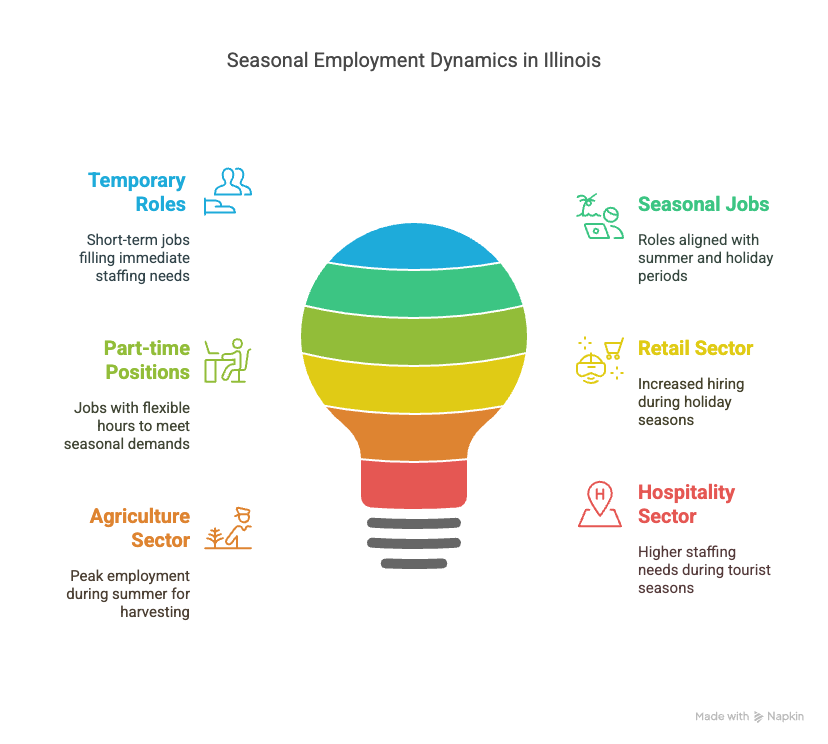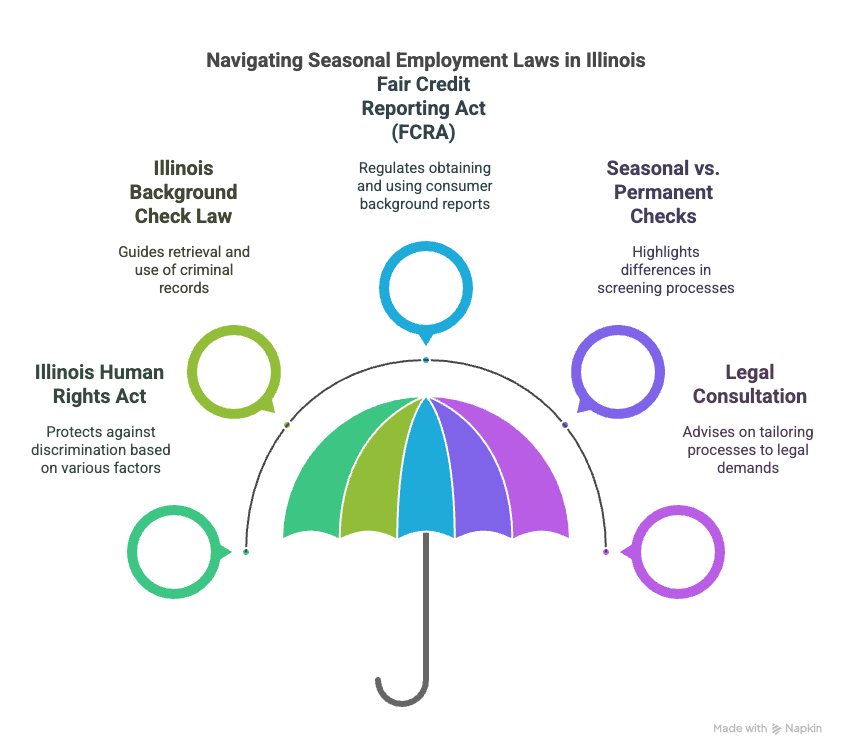Seasonal employment in Illinois brings with it a flurry of opportunities and challenges, whether you're an employer navigating the hiring process or a job seeker eager to land a temporary gig. But behind the scenes, a crucial step ensures that the workforce is trustworthy and safe: the background check. This guide dives deep into the specifics of Illinois seasonal employment background checks, offering valuable insights for both employers and employees alike.
Key Takeaways
- Seasonal employment in Illinois sees hiring surges during summer and holiday periods, necessitating quick yet thorough recruitment processes.
- Background checks are critical for ensuring workplace safety and protecting business reputation, even in temporary roles.
- Awareness of Illinois-specific and federal regulations is essential to conducting background checks legally and effectively.
- Different types of checks, such as criminal history and work authorization, help ensure that seasonal hires are qualified and reliable.
- Leveraging technology in the screening process can significantly improve efficiency and accuracy during peak hiring seasons.
Introduction
In Illinois, seasonal employment surges twice a yearâsummer and the holiday season. These periods see an influx in temporary job openings. Retailers, hotels, farms, and various service providers scramble to fill positions swiftly. When employing temporary staff at this speed, retaining quality remains crucial. Here, background checks play a pivotal role in maintaining a trustworthy workforce.
You may wonder, why emphasize background checks so heavily for short-term roles? For one, the consequences of hiring without proper scrutiny can be severe. It's about more than filling positions; itâs about ensuring a safe working environment and protecting your business. Neglecting this step could lead not only to internal issues but also to reputational harm.
This guide aims to simplify the process of seasonal employment background checks. Youâll learn about the regulations that apply, the types of checks required, and how to manage these efficiently. Whether you're an employer or a job seeker, understanding these checks is essential. Doing so ensures preparation, avoids missteps, and guarantees smoother, safer hiring experiences in Illinois.
Understanding Seasonal Employment in Illinois
Seasonal employment in Illinois encompasses temporary roles that cater to heightened labor demands during specific times of the year. These jobs are typically classified into temporary, seasonal, and part-time categories, each fulfilling unique needs in the job market. Temporary roles are short-term and often not tied to a specific season but fill gaps due to sudden staffing needs. Seasonal jobs align closely with Illinoisâs summer and holiday periods, supporting industries that experience a surge in activity during these times.
The popularity of seasonal employment peaks in sectors like retail, agriculture, and hospitality. During the summer, amusement parks, hotels, and agricultural businesses ramp up staffing to cater to tourists and increased production needs. Retail stores experience a similar pattern during the holiday season, necessitating extra workforce for shopping rushes.

If you're seeking seasonal employment, these periods present a plethora of opportunities. However, the demand also intensifies competition. Knowing the marketâs needs and preparing adequately can set you apart. Employers benefit from understanding the seasonal workforce's dynamics to manage their hiring processes efficiently.
The next time you explore seasonal opportunities or consider your staffing needs, ask yourself: Are you prepared for the surge, and do you understand the trends shaping the seasonal employment landscape in Illinois? Whether you're a worker or an employer, aligning your strategies with these seasonal shifts can lead to success.
Legal Framework for Illinois Seasonal Employment Background Checks
Seasonal employment brings a unique set of legal considerations in Illinois. To get it right, you'll want to be aware of both state-specific and federal regulations that apply to background checks for seasonal hires. Understanding these laws is crucial to avoid potential legal issues.
In Illinois, the backdrop starts with the Illinois Human Rights Act, which protects against unfair treatment due to race, religion, sex, and more. Employers need to ensure their practices align with this act to avoid discrimination claims. Familiarity with the Illinois Background Check Law is also important. It guides you on the retrieval of criminal records and mandates you to follow a prescribed procedure before using these records against an applicant. Ignoring state law isn't an option.
Federal guidelines, including the Fair Credit Reporting Act (FCRA), complement state laws. The FCRA imposes requirements on how you obtain and use consumer background reports. For instance, you'll need written permission from the applicant to access their background report. Missteps here can lead to sizable fines and penalties.
Seasonal employment checks differ from permanent worker checks mainly in processing speed and scope. While permanents may undergo extensive screenings, seasonal roles often require a curated list of checks due to their temporary nature. However, it isn't about cutting corners. Each background check must remain thorough enough to ensure safety and compliance without overwhelming you with unnecessary steps.

Consider discussing with a legal expert or your compliance officer to tailor your process to fit both seasonal needs and legal demands. Are you sure your current protocol covers all bases? Putting an effective legal framework in place can save you from future problems, ensuring that every seasonal hire stands on firm ground legally and ethically.
Types of Background Checks for Seasonal Employment
When it comes to seasonal employment, different types of background checks play a crucial role in ensuring a safe and effective workforce. Each check serves a specific purpose and sheds light on various aspects of an applicant's history.
Criminal History Checks: Checking an applicant's criminal history is a standard practice. It reveals any past convictions that might be relevant to the job. Employers usually look for convictions rather than arrests, as arrests alone arenât proof of wrongdoing. In Illinois, this task must align with state regulations, ensuring fairness while maintaining the need for workplace safety.
Identity Verification: Verifying an applicant's identity is more than checking a name or address. Itâs about confirming that the person youâre hiring is who they claim to be. This can involve reviewing government-issued IDs and personal information. Misidentification can lead to hiring the wrong person, so accuracy here is non-negotiable.
Work Authorization and E-Verify: This involves tools and processes like E-Verify to confirm that applicants are legally authorized to work in the United States. For seasonal roles, employers often face tight timelines, making it tempting to skip this step. However, this verification is essential to prevent legal issues stemming from unauthorized employment.
Industry-Specific Checks: Depending on the industry, there might be additional checks. For instance, jobs in hospitality might require drug testing, while positions in agriculture might require health certifications. These checks go beyond basic screening to address specific concerns related to the role. Understanding the nature of the work helps determine what additional checks are necessary.
Each type of background check serves a purpose and addresses different risks. Balancing thoroughness with respect for applicant privacy is key. Properly conducted checks not only protect your business but also create a safe and trustworthy work environment. What other checks do you think could be necessary for your specific industry?
Illinois Temporary Worker Screening Techniques
When hiring temporary workers in Illinois, efficiency in screening is everything. Seasonal peaks demand quick yet thorough processes, so you need to be prepared. Streamlining background checks during these periods can make a difference in securing reliable staff without getting bogged down in administrative delays.
Focus first on pre-employment planning. Start by defining the specific background checks relevant to your industry. If your seasonal roles involve handling money, prioritize criminal history checks. For roles involving safety-sensitive tasks, consider more in-depth screenings.
Use technology to your advantage. Software like automated applicant tracking systems can expedite typical bottlenecks. These systems integrate with background check providers, reducing data entry and errors, and often offer dashboards that give you a real-time look at where each applicant stands in the process.
Mobile apps provide another layer of convenience. They allow potential hires to submit necessary documents and background information on the move, speeding up their application without confining the entire process to a desktop. This is particularly useful when sourcing a younger, tech-savvy workforce.
Training your HR team is essential. Equip them with tools and guidelines specific to seasonal hiring. Encourage them to preemptively tackle delays by maintaining an organized documentation system, ensuring fast retrieval and verification.
Ultimately, overcoming the challenge of rapid hiring comes down to preparation and utilizing efficient technological solutions. By refining your approach to screening temporary workers, you maintain a balance between swift hiring and thorough checking. How are you currently managing this process, and where could you improve?
Preparing for Summer Job Checks in Illinois
When you're gearing up for a summer job in Illinois, understanding the background check process can make a difference. As a job seeker, clarity and honesty are your best allies. It's beneficial to know what's typically examinedâlike past employment, criminal history, and educational records. Have your documents ready; this preparation speeds up the process and underscores your reliability.
Employers can streamline their summer hiring with a well-organized background check process. Start by defining clear screening criteria relevant to the positions youâre filling. This keeps the checks efficient and focused. Maintain a checklist: confirm identity, check criminal history, verify work authorization, and ensure compliance with Illinois state laws. Using automated tools can reduce turnaround time without sacrificing accuracy.
Both job seekers and employers will find that a smooth background check process lays the foundation for a successful employment experience. Are you prepared?
Holiday Hiring in Illinois: Special Considerations
During the holiday season, the demand for temporary workers in Illinois surges. Retailers, delivery services, and hospitality venues scramble to fill roles. With such high volume, conducting thorough background checks can be challenging. Yet, sacrificing thoroughness for speed is not an option if you want a reliable workforce.
When you face a flood of applications, streamline your process. Use batch processing for checks where possible, and lean on technology. Automated systems can speed up identity verification and criminal history searches. But ensure these systems comply with state and federal laws. Non-compliance could lead to legal issues that overshadow any time saved.
Prioritize roles for thorough checks. Positions handling cash or sensitive information may require deeper scrutiny. Communicate clearly with applicants. Let them know what checks will be conducted and why. This transparency fosters trust and may expedite the process.
Consider seasonal trends in fraud or theft. Adjust your checks to focus on these risks. For instance, retail theft tends to increase during the holidays. Tailor your background checks to filter candidates who might pose a higher risk in these areas.
How do you handle a wave of applicants while maintaining quality? Itâs a question worth pondering. Efficient checks not only safeguard your business but also support a safer workplace for everyone involved.
Agricultural Worker Checks in Illinois
Agricultural employment in Illinois comes with specific challenges. The rural setting and the physical nature of the work can make screening applicants more complex. You must tackle these issues with precision and keep compliance in mind.
One main concern is verifying past work experience in farming. Unlike other sectors, references can be sparse. You may need to reach out directly to previous employers for confirmation. This step is crucial given the reliance on experience-based skills.
Health screenings are significant in agriculture. Workers might face exposure to chemicals or perform heavy labor. Pre-employment health checks can ensure candidates meet physical standards. These checks, though not always mandatory, help reduce workplace incidents.
Pesticide certification checks are often needed. If a job involves pesticide application, you need to verify the applicantâs credentials. Certification confirms they are trained to apply chemicals safely. This step is vital for both safety and legal compliance.
The E-Verify system remains a tool you should not overlook. Agriculture often involves workers from diverse backgrounds. Through E-Verify, you can confirm eligibility to work in the U.S. Doing so not only ensures legal compliance but also protects your operation.
Have you considered seasonal spikes? The demand during peak seasons like planting or harvest can be overwhelming.
Resources and Further Reading
Background checks can feel complex, and staying informed is crucial. To deepen your understanding, consider exploring some key resources. Internal resources like detailed articles and updates on GCheck.com provide practical insights into the background check process, specifically tailored for different industries and employment types.
For federal insights, the U.S. Department of Labor is a reliable source. It covers regulations and guidelines that impact hiring across the nation, offering clarity on compliance and best practices. These resources can help you streamline your processes, ensuring they are both efficient and legally compliant.
These readings can serve as valuable tools whether you are refining your hiring protocols or preparing for background screenings. They can offer you actionable insights to enhance your practices and ensure success in hiring the right candidates. Keep these resources handy as part of your ongoing strategy to support smooth and effective background checking processes.
Conclusion
Conducting background checks for seasonal employment in Illinois is more than a routine step; it's a crucial task that demands precision and compliance. When summarized, the process involves aligning state-specific regulations, understanding the different types of checks necessary, and ensuring a balanced approach between speed and accuracy. As we have explored, whether it's a criminal history check or work authorization through E-Verify, attention to detail remains paramount.
Engagement in this process doesn't end at compliance. For employers, staying informed means ensuring that both your team and procedures are up-to-date with the latest standards and practices. For job seekers, knowledge empowers you to navigate the hiring process with transparency and confidence. Both parties benefit from these efforts, leading to a successful and secure seasonal employment landscape in Illinois.
Frequently Asked Questions (FAQs)
How fast can seasonal background checks be done in Illinois?
Typically, seasonal background checks can be completed within a few days to a week, depending on the speed of gathering information from databases and any additional checks required.
Do Illinois farms need background checks for seasonal labor?
Yes, many Illinois farms conduct background checks for seasonal labor to ensure the safety and security of their operations.
Can minors work seasonal jobs without background checks in Illinois?
While minors can work in seasonal jobs, some positions may still require background checks based on the nature of the role and employer discretion.
Are Illinois temp agencies responsible for background checks?
Yes, temp agencies in Illinois are usually responsible for conducting background checks on the temporary workers they place.
Whatâs the minimum age for seasonal work in Illinois?
The minimum age for most seasonal work in Illinois is 14, although specific jobs might have different age requirements.
Do seasonal retail workers need drug tests in Illinois?
Drug testing for seasonal retail workers varies by company policy. Some employers may require drug tests as part of their hiring process.
How to handle out-of-state seasonal workers in Illinois?
Out-of-state seasonal workers should comply with Illinois employment laws, which may include additional background checks or documentation.
Can a misdemeanor disqualify seasonal hires in Illinois?
Yes, certain misdemeanors can disqualify a candidate, depending on the nature of the offense and the employerâs policies.
Are Illinois amusement parks required to do background checks?
Yes, Illinois amusement parks often conduct background checks, especially for positions involving the safety and supervision of children.
Do seasonal gig workers need checks in Illinois?
Background checks for seasonal gig workers depend on the company or platform guidelines and the nature of the work.
Do restaurants in Illinois require background checks for seasonal staff?
Many restaurants conduct background checks for seasonal staff to ensure a safe working environment and customer trust.
Are background checks mandatory for seasonal workers in Illinoisâ hospitality industry?
While not always mandatory, background checks are common in the hospitality industry to maintain safety and good business practice.
Do landscaping companies in Illinois perform background checks on seasonal employees?
Yes, landscaping companies often perform background checks to ensure the reliability and trustworthiness of their seasonal employees.
Is there a standard procedure for background checks in Illinois?
No standard procedure exists, but most employers follow best practices, including checking criminal records and employment history.
Definitions
Seasonal Employment
These are short-term jobs tied to specific periods of higher demand, like summer or the holiday season. Common industries in Illinois hiring seasonally include retail, agriculture, hospitality, and tourism. Employers use this category to fill temporary gaps without long-term commitments. As a worker, these roles can serve as a foot in the door or a way to earn extra income.
Background Check
This is the process of verifying an applicantâs history before hiring them. It may include checking criminal records, employment history, identity, or eligibility to work in the U.S. In seasonal hiring, it helps employers balance speed with safety. How thorough is your current process?
Illinois Human Rights Act
A law that protects individuals from discrimination during hiring and employment. It forbids unfair treatment based on race, religion, gender, disability, and more. Any background check process in Illinois must follow this law closely. Ignoring it could expose you to lawsuits or fines.
E-Verify
A digital tool that confirms if someone is legally allowed to work in the U.S. It matches information from employeesâ documents against government records. For seasonal jobs, where turnaround time is short, E-Verify helps speed up legal checks. Do you rely on this step each hiring season?
Fair Credit Reporting Act (FCRA)
A federal law that governs how employers collect and use consumer background information. It requires written consent from applicants and outlines clear steps if you intend to take action based on a report. Following the FCRA protects both applicants' rights and your business from legal risk.
References
- Illinois Job Opportunities for Qualified Applicants Act (âBan the Boxâ): https://labor.illinois.gov/laws-rules/fls/job-opportunities-for-qualified-applicants-act.html
- ScoutLogic Illinois Background Checks Guide: https://www.scoutlogicscreening.com/blog/illinois-background-checks-guide/
- ScoutLogic ScreeningâSeasonal Employee Background Checks: https://www.scoutlogicscreening.com/blog/background-checks-on-seasonal-employees/
- Illinois DCFS Background Check Process: https://sunshine.dcfs.illinois.gov/Content/Licensing/BackgroundCheckProcess.aspx
- GoodHire Illinois Background Checks Overview: https://www.goodhire.com/background-checks/illinois/

GCheck Editorial Team
Meet the GCheck Editorial Team, your trusted source for insightful and up-to-date information in the world of employment background checks. Committed to delivering the latest trends, best practices, and industry insights, our team is dedicated to keeping you informed.
With a passion for ensuring accuracy, compliance, and efficiency in background screening, we are your go-to experts in the field. Stay tuned for our comprehensive articles, guides, and analysis, designed to empower businesses and individuals with the knowledge they need to make informed decisions.
At GCheck, we're here to guide you through the complexities of background checks, every step of the way.





